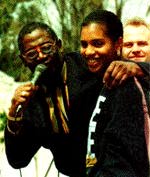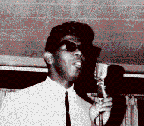 |
Richard Berry
|
Richard Berry was the man who wrote the song "Louie Louie."
In February 1995, Richard reunited with the Pharaohs for the first time in over thirty years. The Pharaohs was the first band that Richard Berry used to record "Louie Louie."
Just 24 hours before his death, Richard's friend Ron Holden died in Mexico. Richard had commented to friends that he wanted to stay close to home so he could be near the Cedar Sinai Hospital in Los Angeles in case of any more health problems. Ron Holden was a member of a Seattle band in the late fifties- early sixties known as The Playboys. Some believe that the Playboys, along with The Frantics and the Dave Lewis Combo, were the first bands to perform the song " Louie Louie " in the Northwest, inspiring Little Bill & The Bluenotes, and the Wailers, who did the first "rock & roll" version of the song ever captured on vinyl. Ron Holden had a hit in the early sixties as a solo artist with his song "Love You So."
Richard Berry was born on April 11, 1935 in Extension, Louisiana. When he was one year old, he was brought to Los Angeles, where he lived most of his life. As a child, he had polio, and used crutches until the age of six, when he had corrective surgery. His first musical venture was the ukulele, which he learned at a summer camp for crippled children.
At Jefferson High School, Richard joined a musical group, the Penguins, with Gaynel Hodge, Cornelius Gunter, Curtiss Williams, Joe Jefferson and Alex Hodge. In the early fifties, this neighborhood, known as the Central District, was a hotbed of musical activity. Richard later joined a group that became known as the Flairs, and was involved with a variety of different musical projects, recording for Dolphin's of Hollywood, Modern Records, Flair Records, and Flip Records.
Richard Beryy was the lead vocal for the Robins before they evolved into the Coasters with the song "Riot In Cell Block #9," which came out in 1954. He also shared vocals with Etta James for her R&B number one hit, "Roll With Me, Henry," which was later retitled as "The Wallflower."
 "Louie "Louie" was originally released as a B-side for "You
Are My Sunshine" on Flip Records in 1957. It was a regional hit
in Los Angeles, and was later embraced as an anthem of sorts in the Pacific
Northwest after the Wailers, featuring the lead vocals of Rockin'
Robin Roberts, released it on the Etiquette label. By the time the
rest of the country had caught up with this song, thanks to the success of the
Kingsmen's version in 1963, Richard Berry had already sold off his publishing
rights to Max Frietag.
"Louie "Louie" was originally released as a B-side for "You
Are My Sunshine" on Flip Records in 1957. It was a regional hit
in Los Angeles, and was later embraced as an anthem of sorts in the Pacific
Northwest after the Wailers, featuring the lead vocals of Rockin'
Robin Roberts, released it on the Etiquette label. By the time the
rest of the country had caught up with this song, thanks to the success of the
Kingsmen's version in 1963, Richard Berry had already sold off his publishing
rights to Max Frietag.
 In 1983, Richard traveled to KFJC, a college radio station based in Los
Altos Hills, California, where a marathon took place to celebrate the
massive impact of this song. Titled "Maximum Louie Louie," this
event marked the first time Richard Berry had ever met any member of the Kingsmen. Jack
Ely, the original vocalist on their hit version of "Louie Louie," flew
down from Oregon for this special occasion. Heavily promoted by a very
ambitious all-volunteer staff, this event was covered by national and international
media, and lasted for 63 hours, with over 800 different versions of the song.
In 1983, Richard traveled to KFJC, a college radio station based in Los
Altos Hills, California, where a marathon took place to celebrate the
massive impact of this song. Titled "Maximum Louie Louie," this
event marked the first time Richard Berry had ever met any member of the Kingsmen. Jack
Ely, the original vocalist on their hit version of "Louie Louie," flew
down from Oregon for this special occasion. Heavily promoted by a very
ambitious all-volunteer staff, this event was covered by national and international
media, and lasted for 63 hours, with over 800 different versions of the song.
Since then, Richard regained his publishing, and finally got the recognition he deserverved, both as the writer of the song, and as the fine musician he was. Dave Marsh has published a book called "Louie Louie" that includes tones of stories and pictures, a film script has been written, and Universal International has embarked on the production.
Eric Predoehl
"He was one of the finest people I have ever known, and I will miss him dearly. It was because of Richard Berry that I decided to produce the documentary "THE MEANING OF LOUIE." Many others have tried to produce this documentary, but Richard Berry always turned them down, letting them know in no uncertain terms that I was the one he gave permission to. I will be forever grateful for his trust, his honesty, and his friendship.
It was at this event (Maximum Louie Louie) that I met Richard Berry, and struck up a friendship that has lasted over thirteen years. Covering this moment for a public access cable channel, I came to recognize this interesting phenomenon that surrounded this song, and decided to create the ultimate documentary on it. I will miss my friend very much.
 About eight months ago, I created a website for Richard
Berry, giving a brief history of his life, and a discography of all
the known recordings I could find out about. If you see any press mention
of his life in your local newspaper or any magazines, please send me a copy.
As always, I can be reached at:
About eight months ago, I created a website for Richard
Berry, giving a brief history of his life, and a discography of all
the known recordings I could find out about. If you see any press mention
of his life in your local newspaper or any magazines, please send me a copy.
As always, I can be reached at:
Eric Predoehl
PO Box 2430
Santa Clara, CA 95055-2430
(408) 749-9757
Associated Press Notice:
"Louie Louie" Composer Dies
Date: Fri, 24 Jan 1997
Richard Berry, the singer-songwriter who penned the rock 'n' roll anthem "Louie Louie,'" has died. Berry died in his sleep at his South-Central Los Angeles home Thursday January 23, possibly of complications from a previous aneurysm, said John Kim, a filmmaker who collaborated with Berry on a short movie while Kim was a film school student last year at the University of Southern California. Berry was about 60, Kim said. Berry wrote the song in 1956 and it has been recorded innumerable times since, most memorably by the Kingsmen in 1963, said Jeff "Stretch" Riedle, who has collected about 1,000 versions of the song. Riedle spearheaded a three-day "Louie Louie" marathon at (KFJC) Foothill Community College in Los Altos Hills in 1983. Asked what the song's appeal is, Riedle said: "Everybody can play it, basically. It's three-chord rock 'n' roll. It defined what garage rock n' roll was about."
With its inscrutable lyrics, the Kingsmen's version caused a national uproar in the mid-1960s when rumors circulated that it contained obscene words.
 The FBI even investigated, playing the record at a variety of RPMs
and concluding it was "unintelligible at any speed," Riedle said.
Berry sold the song for $500 in 1956. An artists' rights group secured the
copyright for him for some $2 million in the late 1980s, Kim said. Nonetheless,
Berry chose to continue living in South-Central. "He lived down there
because that was his home, that's where he grew up," Kim said. "He
was not one of those people who leaves a place just because he made good." Kim
said he is also working with Berry's ex-wife on an authorized biography of
Berry, "American Dreamer: The Richard Berry Story," and a
full-length movie project based on Kim's short film, "The Coast," in
which Berry's music was featured. "He was a tremendously generous man," Kim
said. "He had really been through a lot in his life but rather than have
his hardships (make) him bitter, he had gained a lot of wisdom, and he had
passed it on to other people."
The FBI even investigated, playing the record at a variety of RPMs
and concluding it was "unintelligible at any speed," Riedle said.
Berry sold the song for $500 in 1956. An artists' rights group secured the
copyright for him for some $2 million in the late 1980s, Kim said. Nonetheless,
Berry chose to continue living in South-Central. "He lived down there
because that was his home, that's where he grew up," Kim said. "He
was not one of those people who leaves a place just because he made good." Kim
said he is also working with Berry's ex-wife on an authorized biography of
Berry, "American Dreamer: The Richard Berry Story," and a
full-length movie project based on Kim's short film, "The Coast," in
which Berry's music was featured. "He was a tremendously generous man," Kim
said. "He had really been through a lot in his life but rather than have
his hardships (make) him bitter, he had gained a lot of wisdom, and he had
passed it on to other people."
Copyright 1997 Mercury Center
Republished by permission.